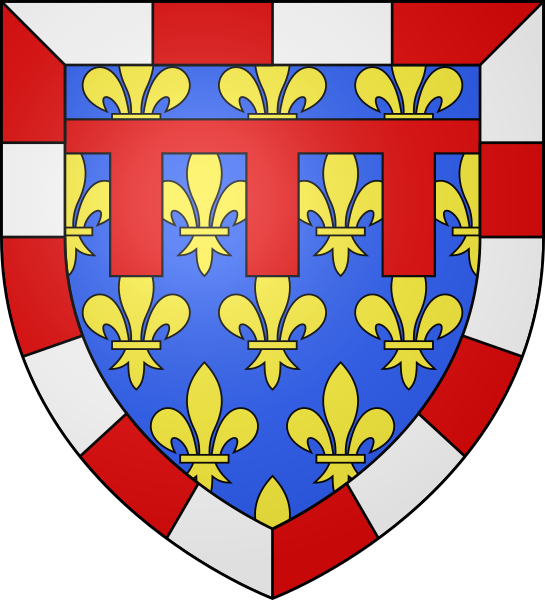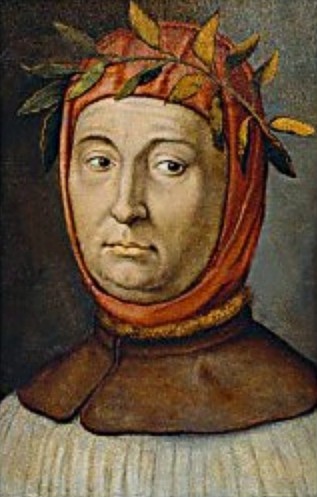 |
| Andrew's Assassination |
The Assassination
On 18th
September Andrew was murdered at Aversa, possibly on Catherine’s order. He was
preparing for bed[i]
when he was informed that a courier had arrived with important paperwork for
him. The report sent to Avignon was quite clear;
‘He went into the
gallery…..Certain ones placed their hands over his mouth, so that he could not
cry out, and in this act they so pressed the iron gauntlets that their print
and character were manifest after death. , others placed a rope around his
neck, in order to strangle him, and this likewise left its mark.’[ii]
Andrew was
suspended over the balcony of his room and the rope holding him was cut. The
sound of Andrew’s body hitting the ground woke his nurse Isabelle. She rushed
in to discover the assailants who hurriedly dispersed at the sound of her
screams. There is a possibility that Joanna was complicit in his death. King
Louis was incandescent with rage at his brother’s murder.
Isabelle
sent her son Nicholas to report to Louis and Elizabeth on Andrew’s death. the
newsmongers of the day now had a story they could sensationalise and Giovanni
Villani had a cracker given to him direct by Nicholas;
‘When morning came, the
entire population of Aversa went to the Queen’s residence to find out who had
perpetrated such a crime, and to exact retribution. The queen suddenly blushed,
and, as if transfixed, kept her head down and her tearless eyes averted.’[iii]
Villani’s
report had Joanna fleeing Aversa leaving Andrew’s body to the elements; the
truth of course is very different; Andrew was buried on the 20th in
the cathedral at Naples.
The same day
one of the assailants was apprehended; Tomaso Mambriccio, one of Andrew’s
personal servants, who had been paid for his involvement in the crime. Andrew
had threatened to execute Tomaso once Andrew had been crowned. Although Tomaso
had been tortured before his death, his torturers had carefully removed his
tongue to ensure that he could not implicate his fellow conspirators, including
the person who had paid Tomaso, who was executed.
The Aftermath
 |
| Joanna's seal |
Both Joanna
and Charles of Durazzo contacted the Hungarian court, seeking their support.
Charles hoped to turn the death of Louis’ brother to his advantage, whilst
Joanna was desperately hoping to placate the Hungarians. She also sent
despatches far and wide attempting to spin the news of Andrew’s murder,
informing the city of Florence[iv] that the principal
assassin had been put to death.
Clement’s
letter in reply warned Joanna;
‘Be sedulously on your guard
as to whom you trust, and whom you ought to avoid.’[v]
One of the
people Joanna needed to guard against was Clement himself who hurriedly wrote
to Louis, failing to mention his ambivalence towards Andrew and his many
changes of policy and the vexed question of Andrew as ruler of Naples. Clement
did not want further strife in Europe; he was already concerned about Edward
III’s posturing in the west. To forestall Louis’ complaints, Clement decided to
send two cardinals to investigate Andrew’s death.
War Comes To Naples
On 25th
December 1345 Joanna gave birth to her son Charles Martel. She placed Charles Martel in the
hands of Andrew’s nurse Isabelle, possibly as a sop to Andrew’s relatives, and
convinced Clement to stand as his godfather. Joanna’s emissary to Hungary was
charged with negotiating Joanna’s release from the nuptial treaty of 1333 to
leave her free to remarry.
Louis was
furious and wrote to Clement alleging that Joanna was his brother’s murderer.
Clement’s emissaries had been dilatory and had not yet arrived in Naples to
even begin their investigations. His mother Elizabeth demanded that Clement
remove Joanna as queen of Naples and crown her third son Stephen king in Joanna’s place. Charles
Martel was to be sent to his grandmother in Hungary.
Joanna
determined to marry her cousin Louis of Taranto. She was in need of a husband who understood the
political undercurrents in her kingdom. As well as being family Louis was tall,
blond and handsome and a tested warrior. Louis’ brother had already forced
Joanna to agree to wed him and now Naples was rent by a war between the two
brothers.
Robert of
Taranto allied with Charles of Durazzo and the two men used their own retainers
to form the nucleus of an army; whilst Louis was forced to recruit a mercenary
army from outside the kingdom, with the assistance of his mother’s lover
Niccolo Acciaiuoili. Robert and Charles, along with the rest of the Durazzo
brothers, claimed they were fighting to bring Andrew’s murderers, who were
allegedly being harboured by Joanna and Louis, to justice. Clement wrote of
Louis;
‘If his marriage is
accomplished, those who are vulnerable for being suspected of participating in
the criminally infamous death of the king are guaranteed by Louis to be
declared safe from punishment.’[vi]
Hugo del
Balzo switched sides and became a secret emissary of the pope’s. The dilatory
behaviour of Clement’s cardinals rebounded, unfairly, on Joanna. The citizens
of Naples objected to the foreign army and protested against Joanna’s
protection of Andrew’s murderers. Philippa’s son Raymond, as seneschal of the
court, ordered that arms were not to be carried in public and he and his men
attempted to enforce his order.
The Nightmare
_(15397707910).jpg/800px-Castel_dell'Ovo_(1)_(15397707910).jpg) |
| Castel dell'Ovo |
Unfortunately
Raymond was captured and was tortured in front of a mob. His tongue was cut out;
even so Charles and Robert managed to extract a long list of Raymond’s
associates despite this obvious drawback. Raymond implicated himself as well as
his mother and many more of Joanna’s associates.
Charles and
Robert urged the mob to attack Castel Nuovo. Joanna had moved to Castel dell’Ovo, the most secure fortress in Naples. It was decided to
besiege the Caste Nuovo and wait for their supplies to run out, which took
three days. Huge del Balzo helped broker the negotiations between the terrified
courtiers and the avenging duo.
The
prisoners were to be transferred to the Castel dell’Ovo for safekeeping until
the Neapolitan chief justice could investigate the claims against them. Hugo
del Balzo offered to transfer the captives by sea, an offer which was accepted.
Instead, once the accused were on board Hugo had his ship moored in the middle
of the bay where he set to with a vengeance;
‘In front of the whole city
and upon the open sea – he naturally tortured poor Philippa, Sancia [her
daughter][vii]
and Robert[viii]
upon a monstrous rack.’[ix]
Having
broken the agreement with a vengeance, Hugo then turned over his captives to
Charles of Durazzo who further tortured the prisoners. The prisoners were
finally moved to Castel Capuano. Louis was forced to retreat to
Capua while his brother took control of Naples. Louis’ army was ordered to
leave the kingdom and citizens were forbidden to aid him.
Civil War
 |
| Benevento |
A war of
moves and countermoves now commenced. Robert of Taranto urged Clement to issue
the dispensation necessary to allow him to wed Joanna, while Joanna wrote to
Clement informing him of her determination never to wed Robert. On 24th
April Robert named himself Captain General of the kingdom; in a counter move on
30th April Joanna assigned control of a large battalion of troops to
Louis. On May 6th Robert took control of all public finances; on 30th
Joanna assigned Louis six thousand ounces of gold.
Despite the maleficent
attentions of his brother, Louis was able to put together an army and upon
reaching Benevento the city surrendered to him. By June
his forces were sited on a hill overlooking Naples. There he waited and
marshalled his forces. But in the north King Louis was preparing to make his
move.
Following an
impassioned letter to Clement from the dowager queen of Hungary demanding that
Maria be divorced from Charles of Durazzo and that Joanna never be allowed to
marry again, Clement informed Elizabeth that her son’s murderers would be
brought to justice, but that if Hungary invaded Naples it would be regarded as
an enemy of the church.
 |
| Castel Dell'Ovo from the sea |
Clement
authorised Bertrand del Balzo, the Neapolitan Chief Justice[x], to investigate Andrews
murder. At the same time he informed Bertrand that any member of the royal
family implicated in the assassination was to be referred to the jurisdiction
of the pope.
Bertrand had
several of the prisoners, who had been tricked into his cousin’s tender care,
tortured and when they confessed had them executed, after stripping them of
their titles and lands.
‘The prisoners
were…..paraded through every street in Naples, flagellated repeatedly, their
flesh mercilessly seared by the torturer’s hot irons….they were spat upon and
stoned. When at length they arrived [at the bonfire]……Master Robert had already
just passed away.’[xi]
Bertrand
took one of Sancia’s Provencal estates for himself[xii].
Bibliography
The Holy
Roman Empire – Friedrich Heer, Phoenix 1995
Joanna –
Nancy Goldstone, Phoenix 2010
Absolute
Monarchs – John Julius Norwich, Random House 2011
A Distant
Mirror – Barbara Tuchman, MacMillan London Ltd 1989
www.wikipedia.en
[i]
He and Joanna had separate bedrooms
[ii]
Joanna - Goldstone
[iii]
Joanna - Goldstone
[iv]
The kingdom’s principal trading partner
[v]
Joanna - Goldstone
[vi]
Ibid
[vii]
Sancia was pregnant and her mother was in her
sixties
[viii]
Robert of Cabannis, another of Sancia’s sons
[ix] Joanna – Goldstone
[x]
And cousin of Hugo del Balzo
[xi]
Joanna - Goldstone
[xii]
Sancia and Philippa were not executed until
later, but their estates were confiscated too




.JPG/450px-Porta_San_Giovanni_(Aversa).JPG)



